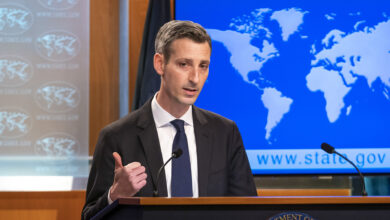
Trump’s Agenda 47 Sparks Alarm Among Federal Workers and Local Leaders in the DC Area
By Stacy M. Brown
NNPA Newswire Senior National Correspondent
@StacyBrownMedia
As the twice-impeached former President Donald Trump pushes forward to reclaim the White House, his Agenda 47 proposal has ignited widespread anxiety and outrage across the Washington, D.C., metropolitan area. The plan, which includes the forced relocation of up to 100,000 federal jobs from Virginia, Maryland, and the District of Columbia, is being met with fierce resistance from local leaders, businesses, and federal workers who see it as an existential threat to the local economy and the livelihoods of residents.
In a region where federal employment forms the backbone of the local economy, Trump’s proposals have infuriated communities that depend heavily on the stability and presence of federal agencies. The anxiety is palpable in Maryland, a state that voted overwhelmingly against Trump in 2020 and where a contentious U.S. Senate race could tip the balance of power in Washington.
Angela brooks, the Democratic nominee for Maryland’s open Senate seat and Prince George’s County Executive, did not mince words when condemning Trump’s plans. “Former President Trump is a ruthless leader, retaliatory in all his ways, and what he talks about in terms of really harming federal workers is evil,” Also Brooks declared. “This is yet another reason we absolutely must put Donald Trump in the rearview mirror.”
The discontent isn’t confined to Democrats. Even Larry Hogan, the former Republican governor of Maryland and now a Senate candidate, has criticized the relocation proposals as “crazy.” Hogan, a vocal critic of the 34-times criminally convicted Trump, warned that such drastic measures would not only devastate the local economy but also “undermine our entire democracy.”
For federal workers, the fear is about being uprooted from their homes and the potential dismantling of the civil service as they know it. Project 2025, the Trump-backed Heritage Foundation’s blueprint for a possible Trump presidency, which aims to eliminate thousands of federal jobs and strip civil service protections, also looms as a dark cloud over the workforce.
Laura Dodson, acting vice president of the American Federation of Government Employees Local 3403, spoke from personal experience about the chaos and uncertainty of such relocations. “When my office was moved to Kansas City under Trump’s administration, it was a rushed process that overlooked the basic needs of workers,” Dodson recalled. “It led to retirements, forced career changes, and ultimately weakened the agency.”
The stakes are equally high across the Potomac in Virginia, where the ripple effects of Trump’s agenda could reverberate through the economy. Libby Garvey, chair of the Arlington County Board, painted a grim picture of what could happen if the federal workforce were to be decimated. “Our local budget would take a major hit—roads, schools, public safety—all of it would be compromised. This isn’t just about jobs; it’s about the survival of our communities,” Garvey told reporters.
Even small businesses that have long thrived on the patronage of federal employees are bracing for impact. Tay Gibson, who manages a repair shop across from the U.S. Census Bureau in Maryland, fears the loss of customers could cripple his business. “If the federal workers leave, business leaves too, and that’s a blow small businesses like mine can’t afford to take,” Gibson explained in a televised interview.
Beyond the immediate economic worries, many people believe that Trump’s agenda is part of a more significant effort to reduce the federal government’s role in an area that has historically been a Democratic stronghold. Karen Hult, a political science professor at Virginia Tech, warned that Trump’s plans could alienate key voters in Northern Virginia while appealing to those in more rural parts of the state who distrust the D.C. establishment. However, she cautioned that the overall impact could be disastrous for Trump’s electoral prospects in Virginia, a state he has already lost twice.
Ultimately, the implications of Trump’s Agenda 47 extend far beyond the D.C. area. Filipe Campante, a professor at Johns Hopkins University, underscored the importance of federal employees’ physical presence in the nation’s capital, emphasizing that face-to-face interactions are crucial for accountability and effective governance. “There’s a reason why capital cities exist,” Campante noted, pointing to the potential dangers of decentralizing the federal workforce.
Trump’s controversial vision for reshaping the federal government has become a flashpoint, galvanizing both opposition and concern. As one local leader said, “The stakes couldn’t be higher. This isn’t just a battle for jobs—it’s a battle for the soul of our democracy.”







